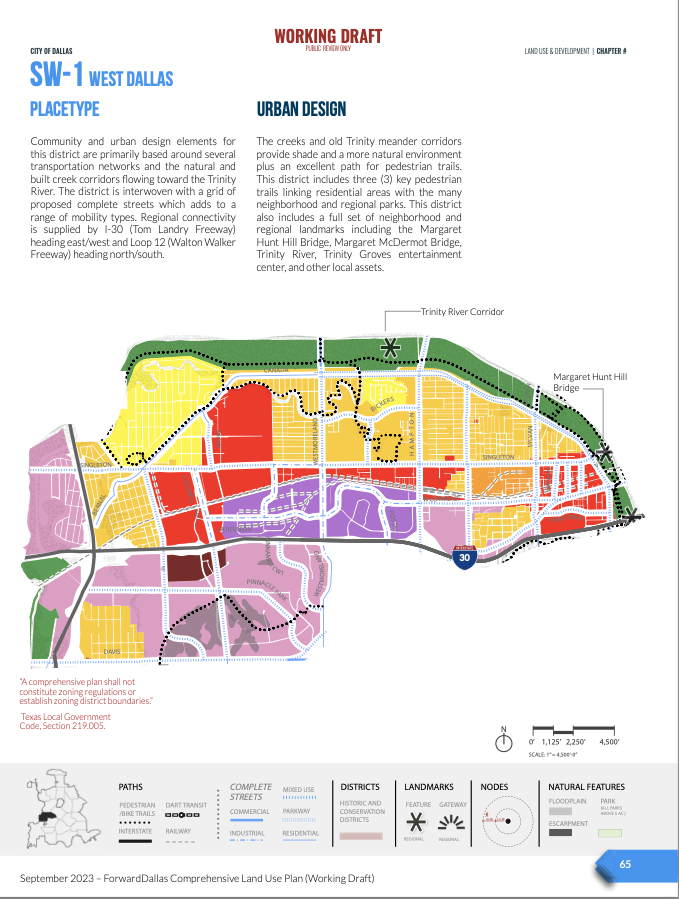The latest on ForwardDallas
Dallas City Council will vote on an updated ForwardDallas land use plan in November, after the plan is reviewed by the City Plan Commission and the Comprehensive Land Use Plan Committee. City officials held a third meeting in West Dallas in September to confirm what neighbors want to prioritize.
Why this matters for West Dallas
Forward Dallas, created by the City of Dallas’ Planning & Urban Design [PUD] department, originally was adopted in 2006 and was revived in early 2021. It is the first citywide, comprehensive plan for Dallas. The update added “placetypes” into the city’s plan, which recommend types of land use for certain areas. This is intended to help areas to create a vision for future development.
The proposed ForwardDallas plan includes a placetype map of West Dallas.

The City says resident input shapes the frequency and borders of the 12 different placetypes. For example, a traditional residential placetype is intended for single-family homes, but may also include schools, parks, or religious institutions. In the plan and on the website, each placetype is accompanied with photos and examples of existing areas in Dallas that fit the description.
Once the plan is adopted, City of Dallas would reference these placetypes to give recommendations on zoning requests, when landowners ask for a change to the way a piece of land can be used. City Plan Commissioners would consult these placetypes to determine whether to approve or deny a zoning change request before it goes before City Council.
What West Dallas neighbors told the City
At the September Forward Dallas community meeting at the West Dallas Multipurpose Center, neighbors didn’t want to hear updates or give feedback on the plan; instead, they used the time to voice their anger over the city’s failures in protecting their neighborhoods.
Ronnie Mestas, a longtime resident of Los Altos, told city staff he is frustrated about the slow response to protect his community from gentrification and overdevelopment. He didn’t have any outright objections to Forward Dallas’ priorities, but says existing problems will push out long-term residents before they can reap the benefits.
“How long is this going to take to implement? Because in five years, we’ll be gone,” Mestas said.
Residents were vocal about their frustration of the city’s lack of implementation and enforcement, citing the Board of Adjustment’s recent decision not to enforce La Bajada’s neighborhood stabilization overlay, as larger and taller homes are constructed.
Neighborhood resident Stephanie Champion says that even beyond La Bajada, new homes across West Dallas often violate the standard residential requirements — on a lot size of 5,000 square feet, homes cannot exceed 30 feet in height. Champion says because the city doesn’t enforce these rules in West Dallas, neighborhood residents are justified in their skepticism of new city plans to increase housing with more multi-family zoning, which would allow for more apartment complexes and townhomes.
“I think what the community needs to hear is, what are the protections we can fight for and put into place now, before this is even passed?” Champion says. “Right now what we’re hearing is, ‘Let’s put in more density because we have the space to do so,’ without the tools to do it the way we want it.”
What City of Dallas officials told West Dallas neighbors
Senior planner Don Raines told residents at the meeting that land use plans are much like a mission statement for a business or organization. While the plans set the intention and lay the groundwork for a space, they aren’t an enforcement tool, and don’t have any “teeth” to prevent the developments that neighbors are worried about. Ideally, he said, these land use plans will lead to new zoning regulations — city policies that give teeth to a plan — and therefore give the city a basis of enforcement.
Dallas Free Press made multiple calls and sent emails to Deborah Carpenter, West Dallas’ District 6 Plan Commissioner, who will vote to approve or deny the updated plan. She also sits on the plan commission’s Comprehensive Land Use Plan committee giving oversight to Forward Dallas updates. She has not yet responded.
In a follow-up interview with City of Dallas PUD staff, interim director Andrea Gilles told Dallas Free Press in a follow-up interview that the plan is designed to address equity issues in the city but emphasized that there’s no one-size-fits-all solution for land use.
“It can’t solve everything, and we have to manage expectations with the citywide comprehensive plan,” Gilles says. “It can make certain recommendations for next steps to really drill down and focus on the details of the issues of what’s going on and coming up with a very detailed package of potential solutions.”
Increased “density,” or more housing units per acre, is a concern among some West Dallas neighbors who have seen more apartment complexes and townhomes built south of Singleton in recent years. Gilles says context is key, so any additional housing should fit a neighborhood and not disrupt existing residences.
“We’re looking at it from a citywide perspective; we need to accommodate more housing everywhere,” Gilles says. “It’s a matter of discussion about how we do it and how we do it sensitively. That is going to be one of the big issues where implementation is going to be really important, and making sure that we have the zoning tools available.”
In the same phone interview, Lawrence Agu III, a chief planner overseeing Forward Dallas, says that integrating feedback of residents, staff, and organizations is one of the hardest, but most important, parts of the project. In addition to feedback given in-person and online, Agu says PUD also coordinates with neighborhood and area plans and is compiling documents to track changes.
“It’s not just the community’s input, it’s not just our review, it’s not just the committee’s review — it’s a comprehensive review of what’s happening in the city,” Agu says. “Our job is to make sure we’re reflecting all aspects of community inputs and let the decision makers basically let us know which way to go [from there.]”
Additionally, chief planner Patrick Blaydes says the city is coordinating with Builders of Hope and their West Dallas Community Vision Plan, and that they’ve heard the frustration from neighbors about the slow pace of progress.
“[We’re asking] how do we incorporate that vision into forward Dallas in a respectful manner where they can see that outcome?” Blaydes says. “One of the critiques in terms of planning — and especially sometimes planning in West Dallas — is that they plan to plan but nothing really moves forward or changes. We want to take that energy that [West Dallas has] and say, ‘Here are some changes that are actually happening that we can be a part of.’ ”
PUD says they are working to publicly share all the feedback given to them, by residents and city officials.
Use your voice
Raines says he wants to continue to hear from community members, through their virtual workshops, events, the online mapping tool, or by inviting PUD to community meetings, and he understands that West Dallas has a unique history, particularly relating to environmental racism and its effects.
“I want West Dallas residents to speak out,” Raines says. “There’s a creative and entrepreneurial spirit here that I want to make sure stays with West Dallas, it’s a place that’s very resourceful … all these little components make this a very special place and a very unique part of Dallas.”
Mestas says that despite his continued frustration with the city, engaging neighbors in conversations to create a stable community is his top priority.
“We’re more concerned with preserving our neighborhoods and our homes that these families have worked hard for,” Mestas says. “As much as I don’t want to hear the same thing coming to these meetings, we’ve still gotta get to these meetings.”

Leave a Reply